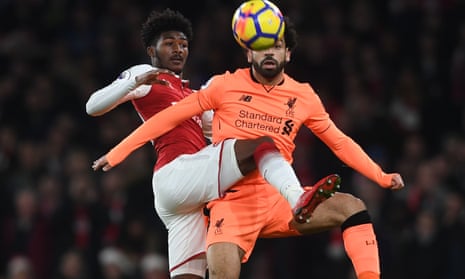Perhaps, in the kind of skewed reading that meetings between Arsenal and Liverpool have come to invite, this fixture was the perfect laboratory for a young full-back making his way.
By the time Ainsley Maitland-Niles, 20 years old and making his third Premier League start, left the field he could at least assure himself that nobody would have noticed any ragged edges very much.
He and his colleagues had been powerless to prevent Roberto Firmino’s equaliser, but the fact that it was the 45th goal in the last 10 meetings between these old rivals spoke more loudly. They have contrived an environment in which anything goes; this, on a wild night that lacked only one final late twist, was a perfect time to be tested in the deep end with scant risk of flailing more than anyone else.
Arsenal had lost their three previous encounters with Jürgen Klopp’s side, all of direct consequence to top-four races this season and last, by an aggregate of 11-4. The sense of jeopardy was heightened before kick-off through Arsène Wenger’s persistence with Maitland-Niles, a converted midfielder whose steady displays against West Ham United and Newcastle did not necessarily inform what might pass here.
Maitland-Niles’s task was, at least, spelled out in bold: go head-to-head with Mohamed Salah, a man who – depending on which reviews you read – was in form redolent of Luis Suárez or even Cristiano Ronaldo.
Maitland-Niles could not keep Salah quiet; on the Egyptian’s current form, barely anyone could. There were moments to cling on to, though: a sharp recovery and dispossession early on when Salah appeared to have rounded him in the way that so embarrassed Bournemouth’s Charlie Daniels last Sunday; a hearty thud of the ball against his opponent’s shins and out for a goal kick as he marauded in search of one last plot twist.
The sense persisted, though, that he was a hostage to forces beyond him. Maitland-Niles could not be blamed for Liverpool’s opening goal, when Arsenal lost possession during a rare attack and James Milner’s pass into the space behind him allowed Salah a run at Laurent Koscielny; his role in the second, losing the ball near his opponents’ corner flag, was clearer but even then Arsenal should have been in better shape to prevent it travelling 100 yards into their net. For 53 minutes they were so uncertain, timid, caught between poles – seemingly obsessed with preventing the counter-counter and radiating discomfort whether in or out of possession.
At that stage the Emirates Stadium crowd, whose growls had grown with every incisive Liverpool break, every move between their front four that bursted with invention and information, would have taken any kind of lift. Thoughts drifted to Sead Kolasinac, who had been deposed again by Maitland-Niles; in a performance so shy of character and personality, would a rumbustious surge up the left tramline, the kind of move the “Tank” showed to be his speciality during the season’s early weeks, have provided exactly the kind of morsel Arsenal might seize on?
In the event it was a moment of inattention from Joe Gomez, with a far starker example of what happens when a full-back switches off, that gave Arsenal their way in. Simon Mignolet’s flap from Granit Xhaka and Mesut Özil’s clipped finish turned everything around within five minutes and, at that moment, Wenger’s latest experimentation appeared – whether by accident or design – to have paid off.
Firmino’s goal, looping in off Petr Cech and partially digging Liverpool out of a situation they should never have found themselves in, made sure nobody watching could get carried away. Those on the pitch continued to: the match retained its basketball-like elasticity until the death, Maitland-Niles eventually walking off inscrutably, perhaps quietly satisfied or perhaps a little punch-drunk.
It had been a hiding to nothing and, if we put Liverpool’s implosion to one side, left Wenger’s judgment open to question. “His pace against Salah, who is quick and moves a lot,” was the reason the manager gave for his selection; that hardly needed explaining but no amount of speed could mitigate for the lack of protection from his team-mates, which was in evidence twice during the first half when he was left two-on-one for successive back-post headers from Firmino.
The frenzied, midfield-less nature of proceedings meant this could never be the time to pass one-off judgment – not on Maitland-Niles, not even on the careless Gomez. Perhaps Wenger does know what he is doing with Maitland-Niles, who he toughened up with a loan to Ipswich – and Mick McCarthy’s school of hard knocks – in 2015-16 and has since sought to make the latest remodelled full-back in a long, generally illustrious line.
On a night like this, though, you would be forgiven for thinking the entire concept of defence had gone out of fashion forever.

Comments (…)
Sign in or create your Guardian account to join the discussion